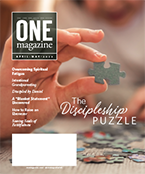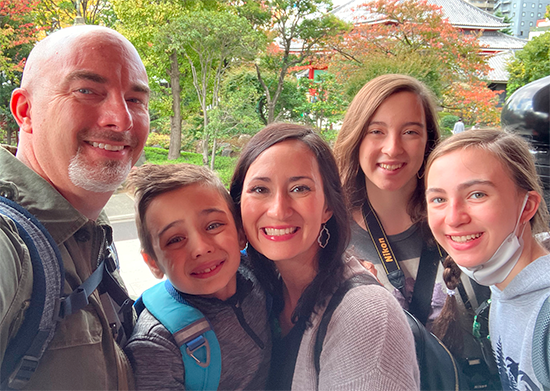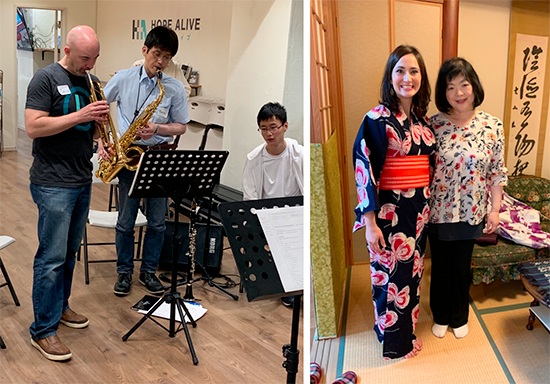
April-May 2023
The Discipleship Puzzle
------------------
|





Thriving in Multicultural Soil
By Jack and Ashley Ketteman
The night we arrived back in the States after two and a half years in Japan, our family of five walked from our gate toward the airport lobby and were warmly welcomed by familiar faces. After these kind people helped us collect our (many) bags, we had a rude awakening. A long line of cars waited for thousands of other travelers, raising tensions and bringing tempers to a boil. When some unkind words were directed toward us, our daughter said, “Let’s turn around and go back right now! We’ve already got our suitcases with us.”
Welcome back, indeed! Despite the excitement of seeing family and friends, and even with the joyful prospect of long-awaited time with grandparents, the shock of American rudeness was almost enough to make our kids want to turn around and make the 13-hour flight back to Japan.
We’ve been asked to address raising missionary kids and helping them navigate between two cultures—neither culture a perfect fit. Two disclaimers: first, we are still new to this after only four years of living cross-culturally, and second, we are not experts…in anything. When our kids succeed at coping with living in two worlds (or anything else, for that matter), it is a result of God’s grace. As we share these thoughts and experiences—some learned from others—we do so with gratitude for the Lord’s faithfulness during these years of major transition for our kids. We have learned the following things about raising missionary/third culture kids during the “steep learning curve” of the last few years.
Without question, the most significant need and gift has been prayer for our kids. Not just from us, but from grandparents and family members, church family and ministry partners in the States and around the world—all covering our children in prayer and inviting God to work on their behalf.
Our story is somewhat different because we were called to Japan when our oldest was starting middle school. Both of our daughters recall specific moments when they knew the Lord wanted them in Japan, too. They are quick to serve because they know they are needed, and their ministry is valuable to the Kingdom. They know they are part of our ministry and the ministry of the Hope Alive team.
Some families attend our church now because of our kids’ friendships. Our girls participate in praise band, assist in outreach events, teach kids’ classes, and watch staff members’ children during events. Our young son Carter even joined in with them to help demo and remodel at church. Living as an obvious minority in a culture with so few Christians helps them see how necessary their witness is.
One of the attitudes adopted early on was the “going on an adventure with God” mindset. We took advantage of opportunities to explore our new country, finding interesting shops and yummy restaurants. When we returned to the States last summer, we also made sure to visit our favorite spots. We took the kids on our travels, visiting new places and seeing a wide variety of subcultures and landscapes unique to the U.S.
We try to appreciate and love the nuances of each culture. For instance, our family enjoys the quiet respect and dignity of Japan, but we also love the freedom, comfort, and friendliness of the U.S. Our kids love gobbling up sushi in Japan and digging into comfort food at grandparents’ tables in the U.S. They enjoy navigating trains in Japan and riding four-wheelers in the States. Our daughters Jane and Callie (ages 15 and 12) experience increased independence in Japan. It’s such a safe place with convenient public transportation. On the other hand, our son Carter (seven) woke up the first day back in the States and asked, “Can I go outside and play?” We replied with a hearty, “Yes!” It was so freeing to have a yard again, with real grass for outdoor play.
Overall, our cross-cultural life has been incredibly positive. Still, we experience frustrations in both cultures. In Japan, many times we think, “Don’t they realize there’s a simpler way to do this?” In the States, we sometimes wish people knew “the Japanese way” to work with dignity or excellence. Our pre-field training at CIT (Center for Intercultural Training) taught us that these and other similar cultural variants should not be considered weird, just different.
Sometimes, our kids feel the need to defend one culture or the other to people who don’t understand. Callie was upset when classmates in Japan listed guns and drugs as the primary global exports from America. We sent her back the next day armed (no pun intended) with a list of helpful exports from her native land. However, during travels in the States, our kids find similarly wrong perceptions about Japan among American children. Though unfortunate, these instances often have become opportunities to help others understand and have helped solidify our kids’ appreciation of both cultures.

The IM family has been a huge help in our kids’ adjustments between cultures (both stateside and on the field in Japan). They also draw support from friendships and mentors at CIT who can relate to them and from the CAJ (Christian Academy in Japan) community where they attend school.
Before Hope Alive began, a pastor told our team planting a church together would allow people to see the “one anothers” of Scripture lived out in the Body of Christ. There is no replacement for our families in the States. But we have found Jesus’ words in Mark 10:29-30 true: leaving family, home, and country to serve Him yields hundreds of blessings—now and eternally.
Our ultimate goal for our kids is not assimilation into Japanese culture (or American culture, for that matter)—it is conformity to the image of Christ. In an early conversation with our team leaders, we received a great reminder. Our children’s spiritual and emotional health is more important than their language fluency. More than anything (speaking the language, blending in, learning “the Japanese way,” being “normal” Americans), we want our children to know and love Jesus and have a personal relationship with Him. He is enough.
Being third culture kids has shaped our children’s views of immigrants. They understand how it feels to be an “outsider,” what it’s like not to understand the language, the discomfort of being the object of stares, and the confusion of not knowing how to act in certain situations. These challenges and others help them remember our citizenship is in Heaven (Philippians 3:20). We make a point to recognize God’s hand regularly and make Christ the most central part of our daily lives. We pray together for lost friends, thank God for daily gifts and prayers being answered, and thank God for partners who give sacrificially to make it possible for us to serve in Japan. We discuss our kids’ doubts and their friends’ beliefs in false gods.
It has been a refreshing and meaningful reminder to realize Jesus was a third culture kid, too. After leaving His perfect home in Heaven, He was born in Bethlehem, lived in Egypt, grew up in Galilee, and ministered throughout Judea and Samaria. (Consider Sara Saunders’ book Swirly as an outstanding resource.) Jesus understands the challenges our children face: being outsiders, lonely, and separated from family. Through all these challenges, they can understand Him more.
A quote hangs on our wall: “Home is where
our family is.”
While that is true on earth, regardless of our address, it is even more true that our ultimate home is Heaven. There, we truly will belong and “fit in.” Until then, we continue to pray our kids will live for Christ and thrive in the multicultural soil in which they’ve been planted.
About the Authors: Jack and Ashley Ketteman recently returned to Japan as career missionaries after completing a two-year internship in greater Tokyo as members of the Hope Alive church-planting team. Hope Alive is a bilingual church in Tokorozawa. Learn more: iminc.org.
|
|

